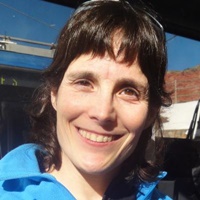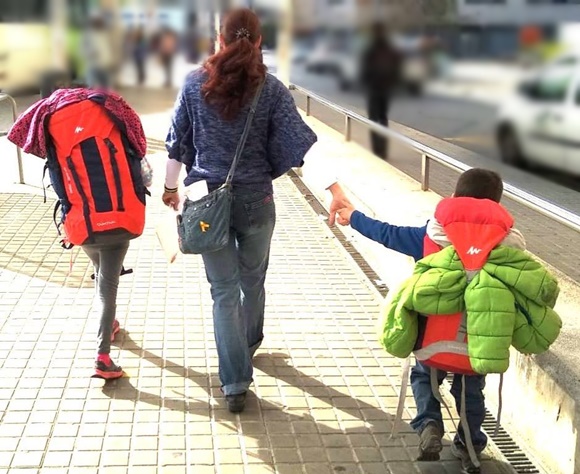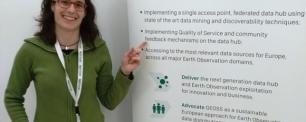Alaitz Zabala, an environmentalist enthralled by geographic information systems
A courageous scientist, able to change course of things when she was almost finishing her degree in Environmental Sciences, constant in focusing her efforts and time on geographical standardization once she detected she was passionate about it. This temperament characterizes CREAF researcher Alaitz Zabala and, to a large extent, has led her to specialize in advanced research on geographic information systems (GIS) and remote sensing, and to teach at the Autonomous University of Barcelona on these disciplines.
She belongs to the Grumets research group and is involved in international projects with Joan Masó’s team, which, together with Xavier Pons, are two constant names in her professional story.
Studying Environmental Sciences was not a random decision, but almost, and she was very attracted to a multidisciplinary career that includes Law, Economics, Physics, Chemistry and Bbiology.
Studying Environmental Sciences was not a random decision, but almost, for Alaitz Zabala. "I was an idealistic young person... I wanted to be a veterinarian, but I soon realised that it meant healing and sometimes sacrificing, and I couldn't bear it." And the desire to study the environment to help manage and improve the environment took shape. "I was also very attracted to a multidisciplinary career that includes Law, Economics, Physics, Chemistry and Bbiology." While preparing the final degree project she took two subjects that introduced her to remote sensing, and that was a turning point. "I realised right away that I was interested and left the final project to be able to do the master's degree in Remote Sensing and Geographical Information Systems”.
Today she teaches in this master’s degree and acknowledges that teaching is very attractive to her, due to the exchange it entails and the obligation to keep up to date. "It's an opportunity, I really enjoy contributing to make progress, to learn and I wouldn't change it for anything. In addition, it helps me a lot to ask question, to rethink. It takes a lot of dedication, but it’s worth it."
An environmentalist who codes
Programming computer code didn’t daunt her. "I'm a straight laced environmentalist, I didn't find it difficult... at least, to try it. And I was lucky to work with Joan Masó, Xavier Pons, Lluís Pesquer and the rest of my teammates”. As a result of this collaboration, she joined the Grumets research group and contributed mainly to the MiraMon Metadata Manager, a geographic information system and remote sensing software constantly updated and improved for viewing, consulting, editing and analyzing satellite images, thematic maps, vector topographies, etc. Far from the cliché of programming as a mechanical task, she points out the need to provide imaginative solutions when coding.

I'm a straight laced environmentalist, I didn't find coding difficult... at least, to try it. And I was lucky to work with Joan Masó, Xavier Pons, Lluís Pesquer and the rest of my teammates.
ALAITZ ZABALA, researcher at CREAF.
Being able to code also facilitated the work she chose for his doctoral thesis in geography, dedicated to exploiting the path of remote sensing and directed by Xavier Pons. “It also had a technological component because it studied how it affects the compression of images with loss to the uses in remote sensing. And it involves an important technological part because this loss affects the classification, the regression and the final use of the images”.
Closing the loop
When asked what remains of the person whose ideals were driven by the desire to contribute to changing the world, she replies that something is connected in her professional life. “I work on providing analytical tools to map browsers, with the aim of bringing geographic information systems to political decision-makers and to people who manage the territory. I am happy because it seems that the idea of helping could be here, if we make the tools reach certain sectors more easily ”. Another example is a doctoral thesis she co-directs with Dr. Pere Serra: "The goal is to use these improvements in map browsers to bring knowledge about the phenological state of sugarcane crops (based on remote sensing) to small producers and cooperatives in Costa Rica."
"Teaching is an opportunity, I really enjoy contributing to make progress and to learn and I wouldn't change it for anything. In addition, it helps me a lot to ask question, to rethink. It takes a lot of dedication, but it’s worth it"
Her journey since she first stepped into a UAB classroom is a series of decisions connected by curiosity and enthusiasm, in which she often utters the word opportunity. “I didn't have any impasse, I was very lucky to be involved in proposals and projects. I am fortunate for the opportunities I have had, despite the uncertainty always present in research today", she says.
Maternity and research
The pace at which her career has been taking shape seems to have been relatively smooth, although she acknowledges difficulties, especially in combining motherhood with research and university teaching. "With the first daughter I was tired... but with the second I had a spectacular setback, because I had to start work very early and the time I could devote to research was limited for a while".
Her two children are now sponges for the questions that she and her partner (also a university professor) constantly generate. "We try to make them think as much as possible, turn situations around, introduce critical and scientific thinking so that they get used to thinking about why things happen".

This action is part of the Severo Ochoa “ULandscape” funded in 2019 by the Agencia Estatal de Investigación of the Spanish Ministry of Science and Innovation to support Research Centres of Excellence.







